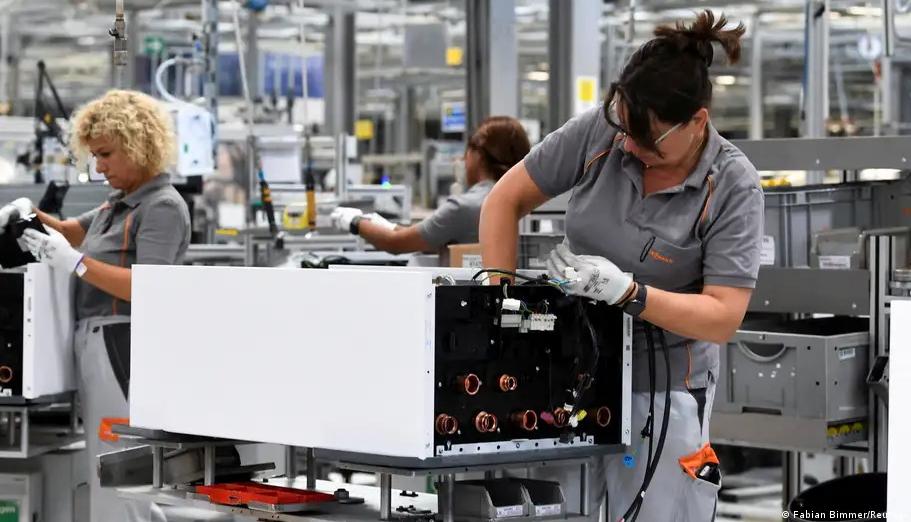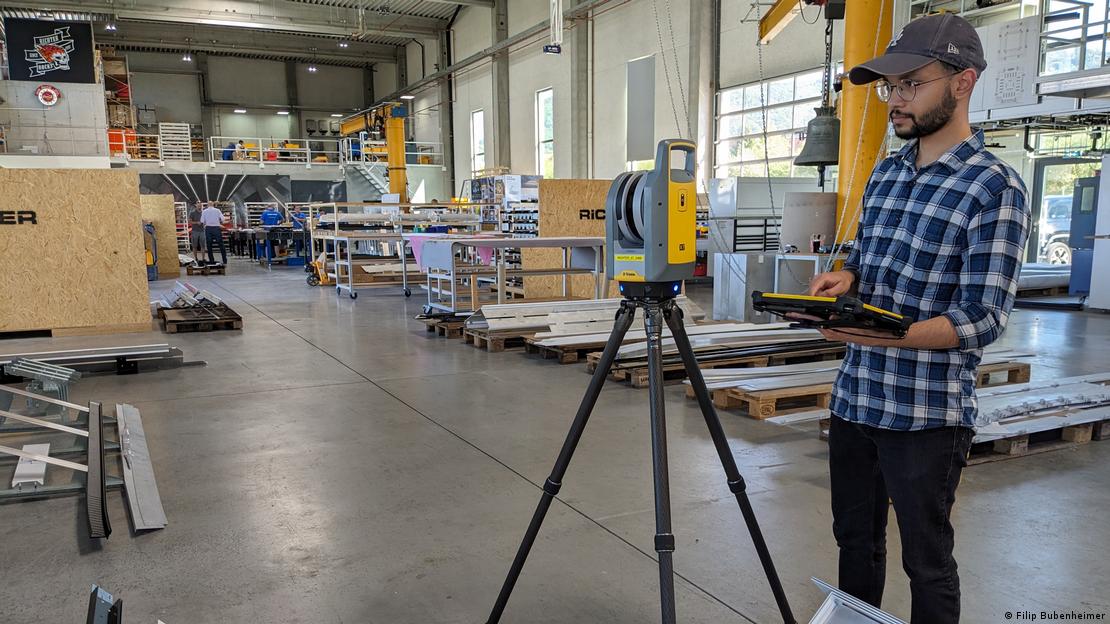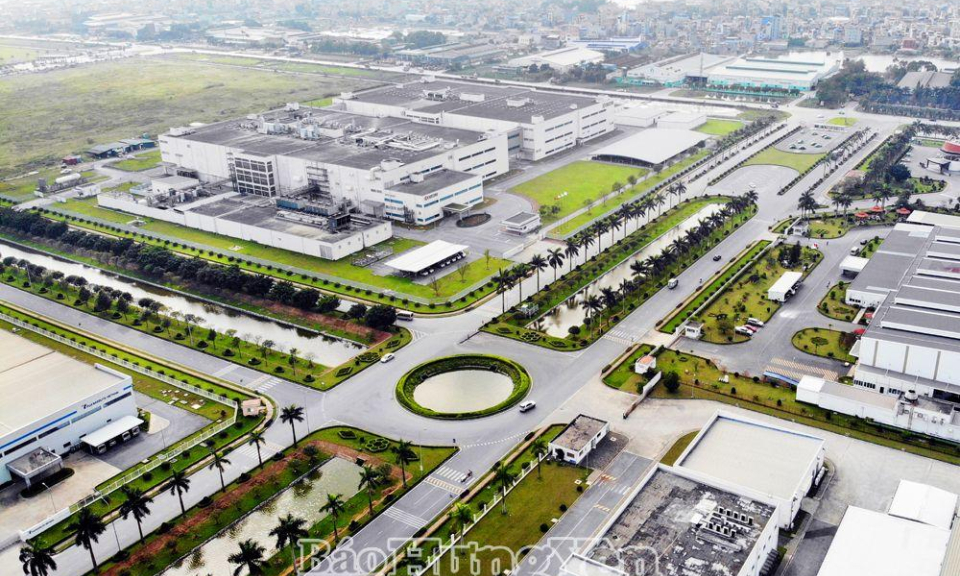Rural areas with many… factories
When visitors gaze out from the ruins of Rosenstein Castle, perched on a large rock above the town of Heubach in the state of Baden-Wurttemberg (southwest Germany), they would hardly suspect that the area before them was a center of engineering and industry.
Fields and forests dominate the landscape, with a few small towns scattered about. But in between, there are factories housing many small and medium-sized businesses, which are the backbone of the town's economy.

Kunjan Patel, a 30-year-old engineer from India, is satisfied with his job and life in the German state of Baden-Wurttemberg. Photo: DW
But Kunjan Patel, a 30-year-old engineer from India, said he found the most attractive part of Baden-Württemberg to be Ostwurttemberg, an hour’s drive east of the industrial capital Stuttgart. “It’s a great area for engineers,” said Kunjan Patel. “There are so many interesting companies here, and each one has its own personality.”
About 450,000 people live in Ostwurttemberg, an area more than twice the size of Berlin. The area boasts many thriving businesses, including more than 300 companies that manufacture tools, engineering and high-tech machinery.
This makes it one of the many regions in Germany that is still quite rural in administrative terms but is economically and industrially important. According to German government statistics, rural areas account for about half of the country's gross domestic product (GDP), which is expected to reach 3.9 trillion euros ($4.1 trillion) in 2022.
Labor shortage
As young people move from the countryside to the cities, the population in many rural areas is aging even faster than the urban population. This means that the countryside needs to attract workers not only from the cities but also from abroad. Although many Germans have recently moved back from the cities to the countryside, the demand for workers in the factories on the outskirts of the city is still greater than the supply.
In this context, local universities play an important role, as they are the hub for companies recruiting foreign graduates in Germany. Kunjan Patel, the engineer from India mentioned in the previous section of the article, works at Richter, a manufacturer of high-end lighting systems based in Heubach, a town of 10,000 people. According to the company, it currently has 110 employees from 34 countries.
Patel joined Richter in 2019. He was hired after visiting the company with a group of international students at nearby Aalen University, where he was pursuing a master's degree.
Persuading international students to stay after graduation is one of the most effective ways to boost the workforce for factories in rural areas, said Markus Schmid, a consultant at the Ostwurttemberg Chamber of Commerce and Industry.
But small and medium-sized companies in Ostwurttemberg have few ways to attract potential foreign candidates. The challenge is greater for them than for global corporations based in the region, which can afford to pay for large-scale recruitment campaigns and hire quality headhunters.
Small companies need to develop innovative approaches
With far fewer resources than multinational corporations, Bernd Richter, owner of lighting company Richter, has had to find his own way to build and maintain a diverse workforce within his company—sometimes with a lot of personal effort: Occasionally, he even hosts new employees at his family estate.
Richter’s hiring approach, he says, is “to never rule anything out.” For example, speaking German is not a strong criterion for him. Richter’s official working language is English. So Indian engineer Kunjan Patel, who says learning German was the biggest challenge of living in Ostwurttemberg, says he’s very happy with Richter’s corporate culture. Not to mention, Richter offers free German lessons for employees.
Heubach Mayor Joy Alemazung says he wants immigrants to feel as welcome as possible. “If I don’t feel different when someone talks to me, I feel at home,” Alemazung says. Alemazung also shares that he can relate to his own experience after moving from his native Cameroon to Germany as a student.
Alemazung said that the community-rich life in rural areas can help promote acceptance of immigrants because it gives newcomers and locals a chance to integrate. In this regard, rural areas have an advantage over cities, he argued.
For Kunjan Patel, who is from Asia, this is important. He says he is happy with the lifestyle that Ostwurttemberg offers. “The social life here is very good,” he told DW, with plenty of events to socialize both inside and outside of work. Patel also enjoys hiking in the Alb, a mountainous plateau in the region. “I love the summer in the Alb,” he said.
This must be good news for Kunjan Patel’s boss. As Richter’s boss puts it, attracting workers to Ostwurttemberg is ultimately a matter of finding “who will be really happy here.”
Defuse the “time bomb”
The efforts of small and medium-sized enterprises in rural areas like Richter are part of the effort to defuse the labor crisis, which DW calls a “time bomb for the German economy.”
For years, German companies have warned of a ticking time bomb at the heart of Europe's largest economy: a shortage of skilled workers. The issue has long been a source of anxious debate, but it has become more heated in recent times.

The lack of skilled workers is one of the main challenges for German companies. Photo: DW
Companies across many sectors in Germany say they are struggling to find the workers they need, and the situation is getting worse. “The lack of skilled workers is one of the main challenges for companies in the German automotive industry,” Andreas Rade, a representative of the German Automotive Industry Association (VDA), told DW. A recent survey of suppliers found that more than three-quarters of companies are currently facing serious staff shortages.
It's a similar picture when looking at Germany's mechanical engineering industry, one of the major drivers of the country's huge export market. "The situation has been getting worse since 2021," Thilo Brodtmann, an analyst at the VDMA, told DW, adding that more than 70% of companies in the sector are facing severe labor shortages.
In response, the German government sees immigration as one of the solutions. In June, the country passed a sweeping immigration reform law, which includes easier criteria for obtaining work visas in Germany and expanded recognition of foreign qualifications. The law is expected to make Germany a more attractive destination for foreign workers.
With that macro-level boost, German businesses, especially small and medium-sized enterprises in rural areas, have also had more opportunities to recruit workers, thereby solving the challenging human resource problem of recent years.
Quang Anh
Source


![[Photo] Prime Minister Pham Minh Chinh chairs meeting after US announces reciprocal tariffs](https://vstatic.vietnam.vn/vietnam/resource/IMAGE/2025/4/3/ee90a2786c0a45d7868de039cef4a712)

![[Photo] A brief moment of rest for the rescue force of the Vietnam People's Army](https://vstatic.vietnam.vn/vietnam/resource/IMAGE/2025/4/3/a2c91fa05dc04293a4b64cfd27ed4dbe)
![[Photo] Prime Minister Pham Minh Chinh chairs the first meeting of the Steering Committee on Regional and International Financial Centers](https://vstatic.vietnam.vn/vietnam/resource/IMAGE/2025/4/3/47dc687989d4479d95a1dce4466edd32)
![[Photo] Ho Chi Minh City speeds up sidewalk repair work before April 30 holiday](https://vstatic.vietnam.vn/vietnam/resource/IMAGE/2025/4/3/17f78833a36f4ba5a9bae215703da710)
![[Photo] General Secretary To Lam receives Japanese Ambassador to Vietnam Ito Naoki](https://vstatic.vietnam.vn/vietnam/resource/IMAGE/2025/4/3/3a5d233bc09d4928ac9bfed97674be98)























































































Comment (0)